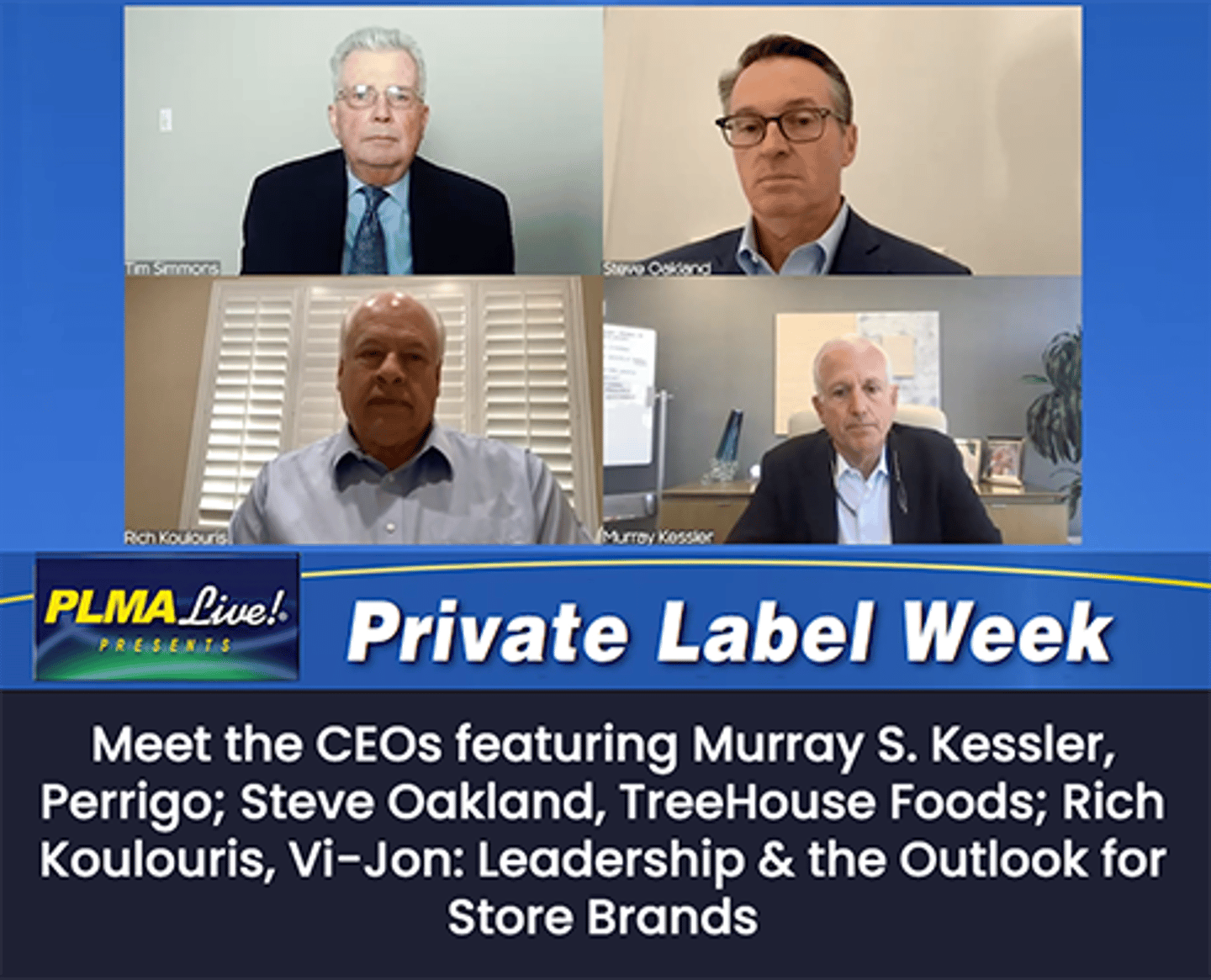From the CEOs: 3 leaders talk supply chain, future of private label
Three CEOs at leading private label manufacturers spoke candidly about supply chain issues during the pandemic and consumer behavior shifts impacting their business in 2021.
Murray S. Kessler of Perrigo; Steve Oakland, TreeHouse Foods; and Rich Koulouris, Vi-Jon, sat down with Tim Simmons of the Private Label Manufacturers Association for a first-of-its-kind panel from PLMA. The session occurred on the final day of Private Label Week.
Regarding the pandemic, all three said the unprecedented demand on products exposed their supply chains like never before, in some ways helping to create some learnings around better ways to manage the supply chain in the future.
Oakland said in food, typically the change in product demand is about 1-2% on a yearly basis, so they weren’t prepared for the level of volatility brought on by pantry loading and hoarding that was being done during the pandemic early on. Kessler said the same, noting that there were quadruple spikes in product demand that put pressure on customer service and profits. Perrigo, for example, had to focus on essential medicines that are lower-margin products, pulling back on other SKUS.
“We made a decision to supply what society needed most over profits,” he said.
Koulouris said in over half of Vi-Jon’s 13 categories, demand was 10-15 times greater than usual, and in a short window they were able to grow capacity by five times, but it still wasn’t enough.
The company had to hold off on certain SKUs and packaging types, as all three companies said they were forced into a level of SKU rationalization. Additionally, Vi-Jon was spending about $1 million a month on keeping employees safe during the pandemic, as all three mentioned that safety was priority No. 1.
In comparison to national brands, the CEOs echoed that private label manufacturers had a rougher go during the pandemic due to the number of SKUs they provide.
Kessler said the essence of private label is specializing in customization, and that’s much more complex compared with a national brand’s focused assortment. Oakland said private label manufacturers run close to capacity to be successful, so national brands might be able to operate with a little more excess capacity, but regardless that level of customer service and getting products to the retailer was an immense challenge for everybody.
Looking at life when the pandemic fades, the executives also discussed how their relationships with retailers hope to change. A positive that came out of the pandemic is the importance of private brands, so hopefully there will be better discussions and collaboration between retailer and supplier, they said.
All three executives saw a lift in product being tried for the first time by consumers during the pandemic, and Kessler cited a McKinsey study that found that the majority of consumers who had a private brand product for the first time intend to keep buying it.
“We got a great running start,” Oakland said. “We got to continue to delight them.”
Kessler said he hopes retailers will see them not just as a national brand equivalent, but that they can innovate, offer customization and ways to grow their categories maybe even better than the national brands.
Other consumer changes that could impact business in the year ahead, Koulouris said their personal hygiene products expect to continue to excel, as consumers will continue to focus more on wellness and hygiene even as COVID-19 fades.
Oakland said foodservice should bounce back at some point, which will level out some gains they’ve seen such as their pasta business growing by 50% last year. TreeHouse’s foodservice side of the business was down as much as 70% at one point, he said.
Koulouris said Vi-Jon is investing $70 million toward expanding capacity in the year ahead. All three leaders of industry are expecting to continue to provide for their retailer customers and with learnings from the pandemic, even more efficiently.


